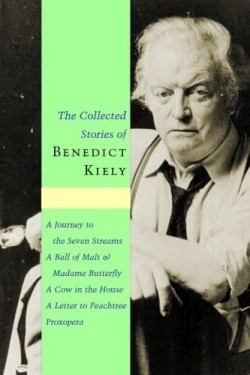It looks like you've stumbled upon a page meant to be read by our code instead of viewed directly. You're probably looking for this page.
The Collected Stories of Benedict Kiely
Reading the first sentence of a short story by this author is much like being thrown into the deep end of a pool when you’re not quite sure how to tread water.
“The Wild White Bronco” opens: “At the age of five, when asked what he wanted to be when he grew up, Isaac said he wanted to be a German.” The first words of “The Fairy Women of Lisbellaw” are: “If it hadn’t been for an elderly blonde that I saw sitting in the sun in a bikini on a lawn in Atlanta, Georgia, I’d never have remembered him again.”
Unapologetically, Kiely pushes the reader into the middle of an intimate, often confusing, situation, to sink or swim with his characters. He intentionally embraces, and uses to his advantage, the all-too-human tendency to eavesdrop on private conversations or slow down while passing car wrecks. Not one to rely on cheap attention-grabbing tricks, Kiely has a real literary choke-hold in his undeniably odd, extremely endearing characters who are just as complex as the sometimes green, sometimes rocky Irish landscape. The half-Japanese prostitute’s pimp in “A Ball of Malt and Madame Butterfly,” for example, is an ex-Al Capone bootlegger who now tenderheartedly serves pints-and more-to lonely men.
Born around the same time that Ireland split from England and established its own parliament, Kiely has been called “the Irish Balzac.” He has worked as a full-time critic for the Irish Independent and as literary editor of the Irish Press, and has written regularly for The New Yorker. Throughout this chronologically arranged collection of his short stories, which begins with selections from 1963’s A Journey of Seven Streams and ends with 1977’s novella Proxpera, he examines the effects of a changing world on ordinary Irish life.
Criticized in the past for being “too Irish” and bending a bit to the stereotypes associated with his country, Kiely’s vivid renderings of smoky Dublin pubs and rural Catholic schoolyards nonetheless show a deep understanding of the loves, laughs, stumbles, and strifes of Ireland’s people.
As a collection, the stories are best absorbed in small sips. Read pages at a time, bursts of rich, humorous, lyrical descriptions-such as “That was the year Tom and himself had been barred from the town’s one cinema because Tom, ever an eager and enquiring mind, had discovered the anti-social use of hydrogen peroxide”—have time to mature in the mind and be fully appreciated.
Reviewed by
Christine Houde
Disclosure: This article is not an endorsement, but a review. The publisher of this book provided free copies of the book to have their book reviewed by a professional reviewer. No fee was paid by the publisher for this review. Foreword Reviews only recommends books that we love. Foreword Magazine, Inc. is disclosing this in accordance with the Federal Trade Commission’s 16 CFR, Part 255.
